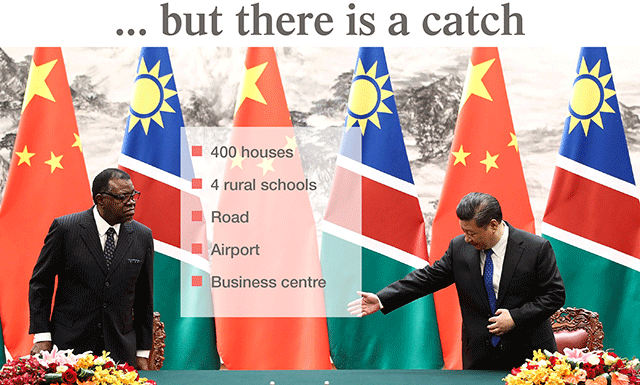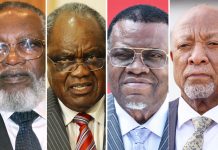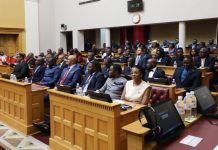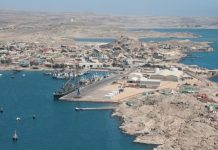This transaction is part of the many deals the government wants to pull off as part of the renewed relationship with the Asian superpower. Even though Namibia will benefit from several deals, there is a catch attached, including giving China land to build a business centre in Namibia.
Details about the deals are coming out as senior government officials continue to discuss how to urgently implement projects agreed to by President Hage Geingob when he visited China this month.
Latest documents show that projects that are being prioritised through funding from China include 400 houses, four rural schools, upgrading of the Hosea Kutako International Airport and the construction of the last phase of a two-lane highway to the international airport.
This information widely circulated in several ministries was sent by the trade ministrys permanent secretary, Gabriel Sinimbo, to Cabinet this week. Sinimbo declined to comment on the matter when approached for comment yesterday.
It is still unclear how much the government wants to borrow from China, but few details are now coming out.
Documents reviewed by The Namibian show that the government plans to borrow around N$120 million from China to build 200 houses each at Gobabis and Grootfontein. Namibia does not have to pay interest on that loan, a document said.
“Gobabis and Grootfontein were the only towns that provided land for this programme,” the document said.
The houses touted as “social houses” will each cost around N$300 000. It is not clear whether that amount can be considered low-cost housing or whether the government could still fall into the trap of building houses that could be too costly for the poor like those built under the mass housing programme.
The Shack Dwellers Federation of Namibia considers a house as low cost if its priced at N$30 000 for a one-bedroom unit or N$50 000 for a two-bedroom structure.
The China-Namibia marriage will be incomplete without the plan to upgrade the Hosea Kutako International Airport and the two-way construction road from Dordabis to the international airport.
“The permanent secretary of works and transport is advised to seek guidance and/or consult with the secretary to Cabinet on the need for a short-term upgrade of Hosea Kutako International Airport, taking into account that the HKIA is eligible for an immediate complete upgrade from the concessional loan facility,” trade ministry permanent secretary Sinimbo wrote to Cabinet secretary George Simataa on 23 April 2018.
The value of the airport upgrades is not yet known.
The Presidency has been secretive on whether the government will use money from China to upgrade the international airport or not.
In fact, presidential spokesperson Alfredo Hengari pleaded ignorance about a possible loan agreement when asked by The Namibian this month.
“The Presidency is not aware of the loan you are talking about,” he said a day before they were set to return to Namibia from China.
Documents show that Geingob and Chinas president, Xi Jinping, agreed to the loan deal and there is now a draft Cabinet proposal to approve that transaction.
“As agreed by the two states presidents, National Planning Commission/Ministry of Finance/Ministry of Works and Transport, to submit documents, particularly for the airport projects and to fast-track the discussion on the combined funding through a grant and concessional loan from the Peoples Republic of China through Chinas Exim Bank,” a Cabinet recommendation from the trade ministry, together with the international relations ministry, said.
Another promise is that the Chinese government will build four schools through an agreement signed between the Chinese and economic planning minister Obeth Kandjoze. The locations of the proposed schools are not yet known.
The government also plans to submit a proposal to the Chinese government about the vocational training centre in Omaheke and the Confucius Institute at University of Namibia (Unam) which will teach Mandarin.
The Chinese government said they plan to invite 230 Namibians to visit China this year for training courses. According to documents, the government thanked the Chinese for donating meteorological and wildlife protection material.
NO FREE LUNCH
The government said in the documents it had agreed to create an industrial economic zone that will be known as the !Nara Namib Economic Zone. Economic zones usually are areas that have specific economic regulations that differ from other areas in the same country.
A submission to Cabinet said the !Nara Namib Economic Zone is expected to have a wide range of economic opportunities such as industrial, logistics, commercial and retail.
The government said it would provide the land for this project.
The Chinese welcomed the offer for the land and promised to encourage cooperation including planning, designing and construction and forming of joint ventures between Chinese and Namibian companies, the document said.
Another agreement that could play into the hands of the Chinese is a deal to construct a space station at Swakopmund.
The last agreement, which allowed the Chinese government to operate a space tracking station at Swakopmund for 15 years, expired in 2015.
“The Chinese side undertook to provide aid funds for the construction of the satellite data receiving ground station,” a memorandum sent to Cabinet this week said.
Documents also show that the two governments agreed to renegotiate the agreement between Namibias state-owned mining company, Epangelo Mining and China General Nuclear Power Group in Husab Uranium Mine through Swakop Uranium.
Epangelo Mining currently owns 10% while the Chinese parastatal owns 90% of Husab.
shinovene@namibian.com.na






